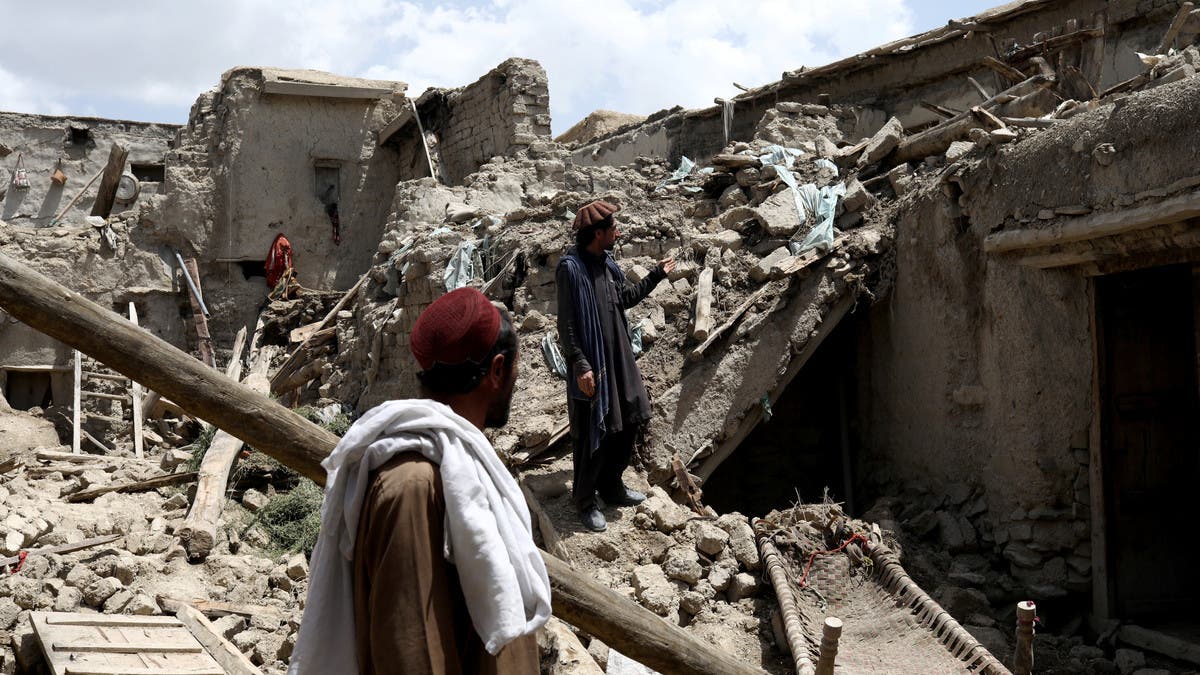An aftershock shook a hard-hit area of eastern Afghanistan on Friday, two days after a quake rattled the region, razing hundreds of mud-brick homes and killing 1,150 people, according to state media.
Pakistan’s Meteorological Department reported a 4.2 magnitude quake in southeastern Afghanistan that state-run Bakhtar News Agency reported took five more lives in hard-hit Gayan District and injured 11 people.
For the latest headlines, follow our Google News channel online or via the app.
The country of 38 million people was already in the midst of a spiraling economic crisis that had plunged millions deep into poverty with over a million children at risk of severe malnutrition.
The magnitude 6 quake on Wednesday that struck in the night as people were sleeping left thousands without shelter and brought into sharp focus the compounding needs of the country.
Afghanistan remains cut off from the international monetary system, and aid groups lament having to pay local staff with bags of cash delivered by hand as nations refuse to deal directly with the Taliban.
Aid organizations like the local Red Crescent and World Food Program have stepped in to assist the most vulnerable families with food and other emergency needs like tents and sleeping mats in Paktika province, the epicenter of the earthquake, and neighboring Khost province.
Still, residents appeared to be largely on their own to deal with the aftermath as their new Taliban-led government and the international aid community struggle to bring in help.
The shoddy mountain roads leading to the affected areas were made worse by damage and rain. Villagers have been burying their dead and digging through the rubble by hand in search of survivors.
The Taliban director of the Bakhtar agency said Friday the death toll had risen to 1,150 people from previous reports of 1,000 killed. Abdul Wahid Rayan said at least 1,600 people were injured.
The United Nations Office for the Coordination of Humanitarian Affairs has put the death toll at 770 people.
It’s not clear how death toll counts are being reached, given the difficulties of accessing and communicating with the impacted villages. Either grim toll would make the quake Afghanistan’s deadliest in two decades.
State media reported that close to 3,000 homes were destroyed or badly damaged. In the district of Gayan, at least 1,000 homes were damaged by the earthquake. Another 800 homes in the Spera district of Khost province were also damaged.
While modern buildings withstand magnitude 6 earthquakes elsewhere, Afghanistan’s mud-brick homes and landslide-prone mountains make such quakes more dangerous.
Roads in the area are so poorly paved and difficult to navigate that some villages in Gayan District take a full day to reach from Kabul, though it is only 175 kilometers (110 miles away.)
In villages across Gayan district, toured by Associated Press journalists for hours Thursday, families who had spent the previous rainy night out in the open lifted pieces of timber of collapsed roofs and pulled away stones by hand, looking for missing loved ones. Taliban fighters circulated in vehicles in the area, but only a few were seen helping dig through the rubble.
There was little sign of heavy equipment — only one bulldozer was spotted being transported. Ambulances circulated, but little other help to the living was evident.
One 6-year-old boy in Gayan wept as he said his parents, two sisters and a brother were all dead. He had fled the ruins of his own home and took refuge with the neighbors.
Many international aid agencies withdrew from Afghanistan when the Taliban seized power last August. Those that remain are scrambling to get medical supplies, food and tents to the remote quake-struck area.
UN agencies are also facing a $3 billion funding shortfall for Afghanistan this year. Germany, Norway and several other countries announced they were sending aid for the quake, but underscored that they would work only through UN agencies, not with the Taliban, which no government has officially recognized as of yet.
Nations have called on the Taliban to first address human rights concerns, chief among them the rights and freedoms of Afghan women and girls.
The International Rescue Committee has emergency health teams in the two provinces to deliver essential first aid and said it is providing cash support to families who have lost their homes and livelihoods in the earthquake.
The organization, which has been operating in Afghanistan since 1988, is calling for an international roadmap to ultimately release Afghanistan’s foreign exchange reserves.
The Taliban’s takeover of the country last year as the US was preparing to withdraw its troops prompted the Biden administration to freeze around $9.5 billion that the Afghan central bank has in US banks, hampering the new rulers’ efforts to pay civil servants and import goods.
Trucks of food and other necessities arrived from Pakistan, and planes full of humanitarian aid landed from Iran and Qatar.
India humanitarian relief and a technical team to the capital, Kabul, to coordinate the delivery of humanitarian assistance. India says its aid will be handed over to a UN agency on the ground and the Afghan Red Crescent Society.
In Paktika province, the quake shook a region of deep poverty, where residents scrape out in a living in the few fertile areas among the rough mountains.
There are projections, quoted by the UN and others, that poverty rates may climb as high as 97 percent of the population and unemployment to 40 percent this year.
Read more:
Afghanistan ends search for survivors of deadly earthquake
UN says Taliban interfering with aid, resisting cash plan
US ‘saddened’ by Afghan earthquake, looks at aid

 World3 years ago
World3 years ago
 World3 years ago
World3 years ago
 Business11 months ago
Business11 months ago
 Entertainment7 years ago
Entertainment7 years ago
 World7 years ago
World7 years ago
 Entertainment7 years ago
Entertainment7 years ago






